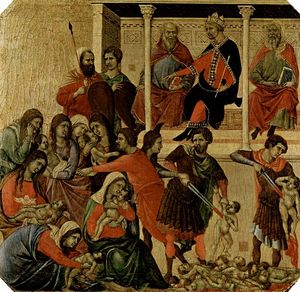Today’s feast of The Holy Innocents has renewed meaning with the recent tragedy involving the death of 20 children in Newtown, CT on December 14. The entrance antiphon for Mass is rather startling (as is the Collect): “The innocents were slaughtered as infants for Christ; spotless, they follow the Lamb and sing for ever: Glory to you, O Lord.”
The Most Reverend Peter A. Rosazza published this editorial on his Facebook page:
On December 28th
our church commemorates the massacre of the Holy Innocents by King Herod
shortly after the birth of Jesus. The Magi disturbed Herod when they asked him
where they could find the new-born King since they had been led by his star to
Jerusalem. Herod, jealous of his power, sent soldiers to kill all baby boys two
years of age and younger in Bethlehem and its surroundings. Some scholars
estimate the number at approximately twenty-eight.
Just two weeks earlier, on
December 14th, another massacre of innocents occurred. As we know, eight boys
and twelve girls, between the ages of six and seven, along with six women, were
executed by twenty-year old Adam Lanza who had first killed his own mother. The
principal of the school another woman ran toward him and were killed in the
process.
As I reflected on this horrendous event, I returned to the birth of Jesus on Christmas. The Son of God became a man like us in all things but sin. His name means, “God saves,” because he literally saves us from our own evil inclinations such as anger that can move people to kill others. Thanks to Jesus, the anger that the immense majority of us experiences does not move us to kill. As an Indian proverb has it, “Anger in the throat and not in the heart.”
Jesus also has a prophetic name, Emmanuel, meaning “God with us,” something he expressed when he said that he would be with us until the end of time.
Because he became one of us, he knows our life and the one he chose was not easy. Jesus was born to a humble mother and foster father in a land that was oppressed by the occupying Romans. Shortly after Jesus was born, Joseph had to take Mary and Jesus to Egypt where they lived for two years until the Herod’s death made it safe for them to take up residence in the poor town of Nazareth in Galilee.
The ordinary people were heavily taxed, by the Romans, by Herod and by the Temple authorities. Because he was deemed a threat by these authorities, they warned the Romans who had Jesus crucified.
Interestingly, Jesus didn’t die of a heart attack. The evil of Good Friday lost on Easter when he rose from the dead and he remains with us as Emmanuel, the source of love, goodness, light and truth for all human beings.
The Evil one has tried throughout the ages to get Jesus to give up on humanity, something that will never happen even in the face of the many horrific acts of the last century that included two world wars and the Holocaust during which six million of Jesus’ own Jewish people perished.
Evil, however, never has the last word. The Nazis were defeated and most communist regimes have fallen. The evil of the terrorist attack of 9-11, can be seen in light of the fall of the Berlin Wall on 11-9, 1989, marking the demise of communism in Eastern Europe.
Now back to Newtown. The tragedy begot an outpouring of goodness from all over the country and the world. The hatred of one individual was confronted by the love of those professionals who gave their lives to protect the children in their care and by so many who grieved with the victims’ families and friends and in particular the children and school faculty who survived. Ultimately love is stronger than hatred.
This was evident when the parents of two of the young victims asked for prayers for the Lanza family.
Moreover, so many people of faith in that area came together to pray for the victims and their families. Christians among them derived strength and courage to persevere from the Babe of Bethlehem, Emmanuel, God with us. He will always be the source of our love and the strength to persevere because we believe that, in the final analysis, love will overcome hatred, truth will overcome falsehood and light will overcome darkness. Amen. (671)
